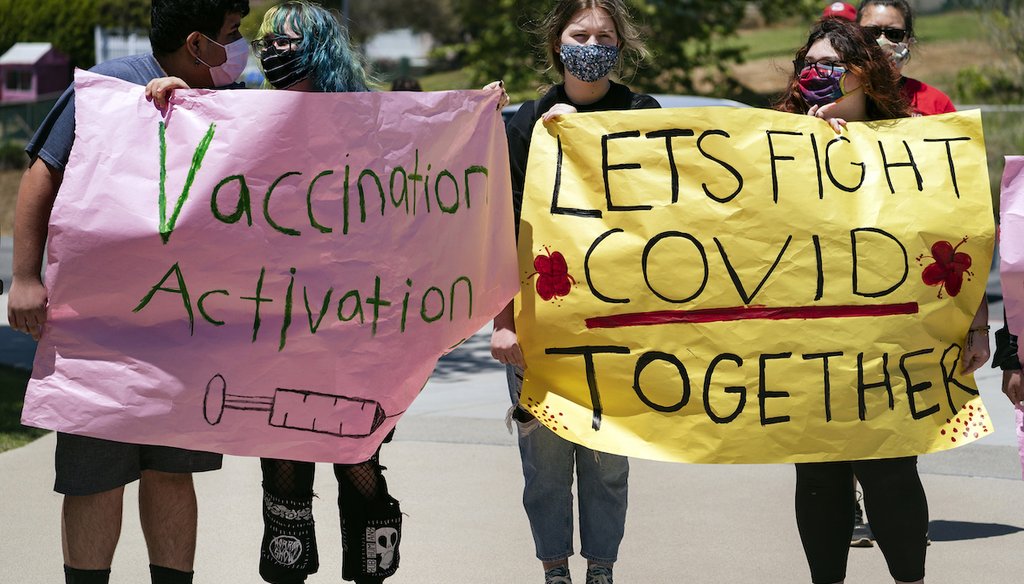Get PolitiFact in your inbox.

San Pedro High School students hold vaccination signs at a school-based COVID-19 vaccination event for students 12 and older in San Pedro, Calif., Monday, May 24, 2021. (AP)
If Your Time is short
-
States mandate that children get multiple vaccines to enter school, but so far they aren’t mandating the COVID-19 vaccine.
-
COVID-19 vaccines are only available for ages 12 and up as part of an emergency use authorization. There are no vaccines currently available for students under age 12.
-
Scientific and political considerations could be influencing states to not yet add the COVID-19 vaccine to their lists of required vaccinations for school entrance. It’s possible that full approval from the U.S. Food and Drug Administration or the emergency use approval for younger children could influence states to add the vaccine to the list of mandated school vaccines.
Nationwide, before parents drop off their children at the start of the school year, one important task on their to-do list is to submit the required proof of vaccinations.
But one vaccine is noticeably absent from the list of state-mandated vaccines for school enrollment: the COVID-19 vaccine, which has been available to children ages 12 and older for months. Some states have taken the opposite approach by passing legislation that restricts schools from requiring the vaccine.
We wondered, why have states not required the COVID-19 vaccine for most middle and high school students?
The short answer is that states could choose to mandate the vaccine for school students ages 12 and up, but they haven’t gone down that path. The obstacles are that the vaccine has not yet received full authorization status, and it isn’t available to all ages of school children.
"Mandating a vaccine in school is always a struggle. It takes political capital to succeed, and I expect school districts and states would rather not have to fight this twice, once for 12 and up, once for 5 and up," said Dorit Reiss, an expert on vaccine mandates at UC Hastings law school. "That said, with the delay in relation to five and up, and with the increase in cases through delta, that calculus might change."
Pfizer’s vaccine received emergency use approval by the Food and Drug Administration in May for children ages 12-15 . Vaccine trials for younger children by multiple companies remain underway, and industry experts predict that a vaccine will be available for ages 5-11 sometime this winter.
Although severe illness from COVID-19 for children is rare, an increasing number of children have caught COVID-19 this summer as the delta variant spread. About 121,000 children were reported as testing positive for COVID-19 for the week ending Aug. 12, representing about 18 percent of all cases, according to the American Academy of Pediatrics. In total since the start of the pandmeic, about 4.4 million children have tested positive.
Who decides which vaccines are required for children to enter school?
States are responsible for setting required vaccination schedules for school attendance.
Many states choose to align their rules with recommendations by the U.S. Centers for Disease Control and Prevention, which seeks input from their Advisory Committee on Immunization Practices, a panel made up of medical and public health professionals. (One exception is the HPV vaccine, which the committee has long recommended, but few states mandate.) The committee has in general recommended the COVID-19 vaccine for everyone ages 12 and older — and so has the American Academy of Pediatrics.
Each state has its own procedure for setting the required vaccination schedule, which can involve decisions by state health officials, the Legislature or both.
"This is a fairly elaborate process," said William Schaffner, a health policy professor at Vanderbilt University in Tennessee.
States commonly require school children to be vaccinated to protect them from various diseases including polio, measles/mumps and rubella (MMR), diphtheria/tetanus/pertussis (DTaP), varicella (chicken pox), haemophilus influenzae type b (Hib) disease and hepatitis B.
Many states allow religious or philosophical exemptions, but the majority of students get vaccinated. Nationwide during the 2019-2020 school year, 94% or more of kindergarteners received their required vaccinations.
Why is the COVID-19 vaccine not mandated by any state for school entrance?
Medical experts say vaccinating children is part of the strategy to mitigate transmission of COVID-19. But we found no state has yet to require the vaccine for students ages 12 and older.
A database of 100 large urban districts by The Center for Reinventing Public Education shows the only major district to require the vaccine for students is in Hawaii and only for athletes. The database tracks various pandemic prevention strategies for schools such as mask rules and vaccination mandates for staff. (These numbers remain in flux and may change as more schools open their doors or experience case spikes.)
The Justice Department’s Office of Legal Counsel, which advises the president, issued an opinion in July that emergency use authorization does not prohibit public or private entities from mandating the vaccine. But that opinion alone may not move states, which generally appear to be waiting for full authorization.
"Although this opinion is well-reasoned and persuasive, it carries little legal authority outside the federal government, and would likely get limited deference in court," wrote Reiss, the UC Hastings law professor, and Arthur Caplan, a bioethics professor at New York University.
Despite benefits of childhood vaccination, the COVID vaccines are still relatively new and lack long term safety data. That means mandating the vaccine for children would be premature, Georgetown law professor Lawrence Gostin and other experts wrote in a viewpoint piece for The Journal of the American Medical Association in June.
"Using incentives instead of mandates would avoid public backlash that could undermine the SARS-CoV-2 vaccine rollout," they wrote.
Also, multiple states have already taken action via legislation or executive order to prohibit COVID vaccine mandates, said James G. Hodge, an expert on health law at Arizona State University.
Pediatricians, however, have urged parents to get their children vaccinated once they are eligible. University of Minnesota professor of pediatrics Mark Schleiss along with colleagues wrote an article arguing that the vaccine will help protect children from disease, protect their families and community contacts and allow for safe in-person schooling. (Schleiss is a paid advisor for a Moderna program for a different virus but does not have any role in the Moderna COVID vaccine program.)
"Ultimately the control of SARS-CoV-2 infection in children will not only protect their health, but will represent the ‘endgame’ in enabling long-term control of the COVID-19 pandemic for all age groups," they wrote.
Past efforts to add a vaccine to the list of mandates have brought out vocal opponents. So approving a COVID vaccine requirement is a process that states may not want to go through twice: once now and then again when the vaccine is available to elementary school students or when it gets full authorization.
"If you look at the hullabaloo over masks and low vaccination rates ages 12-17, I think (vaccination mandates) would not go over well at the present time," Schaffner said. "There would be a huge uproar in my state. We are debating with embarrassing intensity kids wearing masks."
Many parents have shown resistance to vaccinating their teenagers. Slightly less than half of people ages 12-17 have received at least one shot as of mid-August. Slightly less than half of parents of K-12 students support requiring vaccines for high school students, and that number drops to 43% for parents of middle school students, according to a Gallup poll.
How long have school vaccination mandates been around for?
Overall, school vaccination mandates have been key to getting the vast majority of children in the United States vaccinated. Cities and states started to mandate vaccinations for school in the 19th century, although "enforcement was complicated by active resistance and apathy," according to a 2002 article in the Kentucky Law Journal by Hodge and Gostin.
In more recent decades, many school vaccination laws were enacted in response to the transmission of measles in schools in the 1960s and 1970s, they wrote. "State legislatures at that time were influenced by the significantly lower incidence rates of measles among school children in states with comprehensive immunization laws," they wrote.
RELATED: Ask PolitFact: When will the COVID-19 vaccines get FDA approval?
RELATED: What does the approval of Pfizer's Covid vaccine for teens and preteens mean?
RELATED: Reading, ’rithmetic and resisting COVID-19: The new 3 R’s as kids head back to school
RELATED: 10 types of COVID-19 vaccine misinformation swirling online, fact-checked
Our Sources
National Conference of State Legislatures, State Immunization Policy Overview, Feb. 26, 2021
National Conference of State Legislatures, States With Religious and Philosophical Exemptions From School Immunization Requirements, April 30, 2021
National Conference of State Legislatures, Routine Child Vaccination, July 2021
American Academy of Pediatrics, Children and COVID-19: State-Level Data Report, Aug. 5, 2021
American Academy of Pediatrics, American Academy of Pediatrics Updates Recommendations for Opening Schools in Fall 2021
Center for Reinventing Public Education, School District Responses to COVID-19 Closures, 2021
Vaccine commentary by Mark Schleiss, Professor of Pediatrics in the University of Minnesota Medical School, et al, Children are the key to the Endgame: A case for routine pediatric COVID vaccination, Aug. 12, 2021
Kentucky Law Journal, James G. Hodge and Lawrence O. Gostin, School Vaccination Requirements: Historical, Social, and Legal Perspectives, 2001
American Journal of Public Health, Public Health and the Politics of School Immunization Requirements, May 2005
Wall Street Journal, Can Schools Mandate Covid-19 Vaccines for Children? What We Know, June 11, 2021
Kristine Bowman in The Conservation, Can schools require COVID-19 vaccines for students now that Pfizer’s shot is authorized for kids 12 and up? May 10, 2021
CNN, These routine shots already are required in schools, as more states ban Covid-19 vaccine requirements, July 21, 2021
Viewpoint Journal of American Medical Association, Mandatory SARS-CoV-2 Vaccinations in K-12 Schools, Colleges/Universities, and Businesses, June 7, 2021
STAT News, A solution to the murky legal status of vaccine mandates: rewrite vaccine EUAs, July 27, 2021
U.S. Department of Justice, Whether Section 564 of the Food, Drug, and Cosmetic Act Prohibits Entities from Requiring the Use of a Vaccine Subject to an Emergency Use Authorization, July 6, 2021
Naples Community Health, Video about COVID-19, August 2021
Kaiser Family Foundation, The HPV Vaccine: Access and Use in the U.S. July 12, 2021
Kaiser Family Foundation, KFF COVID-19 Vaccine Monitor: Parents and the Pandemic, Aug. 11, 2021
CNBC, Schools weigh vaccine and mask mandates as students prepare to return, Aug. 7, 2021
Gallup, U.S. K-12 Parents Support Mask Mandate, Divided on Vaccines, Aug. 3, 2021
U.S. Food and Drug Administration, Pfizer-BioNTech COVID-19 Vaccine for Emergency Use in Adolescents in Another Important Action in Fight Against Pandemic, May 10, 2021
U.S. Centers for Disease Control and Prevention, Vaccines for children program, Accessed Aug. 16, 2021
U.S. Centers for Disease Control and Prevention, Who sets the immunization schedule? Accessed Aug. 15, 2021
U.S. Centers for Disease Control and Prevention, Table 1. Recommended Child and Adolescent Immunization Schedule for ages 18 years or younger, United States, 2021
U.S. Centers for Disease Control and Prevention, Vaccination Coverage and Exemptions among Kindergartners, 2019-20
U.S. Centers for Disease Control and Prevention, Covid data tracker, Aug. 15, 2021
U.S. Centers for Disease Control and Prevention, Ten Great Public Health Achievements -- United States, 1900-1999
Hawaii State Department of Education, HIDOE implements new safety guidelines with vaccination requirements for athletes, adults to participate in sports, Aug. 4, 2021
PolitiFact, Trump broke promise to slow down vaccine schedule, July 15, 2020
PolitiFact, 5 facts about vaccines, Nov. 1, 2019
Email interview, Katherina Grusich, CDC spokesperson, Aug. 13, 2021
Email interview, Michael Fraser, Chief Executive Officer of the Association of. State and Territorial Health Officials, Aug. 13, 2021
Email interview, Dorit Reiss, UC Hastings Professor of Law, Aug. 13, 2021
Email interview, James Hodge, Director, Center for Public Health Law and Policy at Sandra Day O'Connor College of Law at Arizona State University, Aug. 12, 2021
Email interview, Lawrence Gostin, Georgetown Law university professor and Faculty Director, O'Neill Institute for National and Global Health Law, Aug. 12, 2021
Email interview, Mark Schleiss, University of Minnesota professor of pediatrics, Aug. 15, 2021
Email interview, Myra McGovern, spokesperson for the National Association of Independent Schools, Aug. 12, 2021
Telephone interview, William Schaffner, professor of preventive medicine at Vanderbilt University, Aug. 14, 2021
Email interview, Katy Payne, spokesperson for the Office of Superintendent of Public Instruction in Washington state, Aug. 16, 2021
Email interview, Jennifer Laudano, spokesperson for the National Academy for State Health Policy, Aug. 2021












































